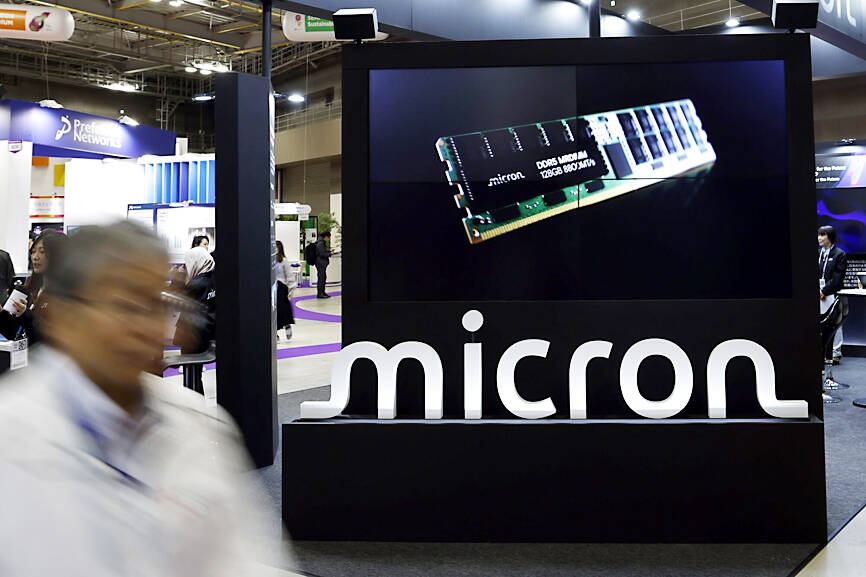Micron Technology Inc, the largest US maker of computer memory chips, tumbled in late trading after its revenue forecast missed projections by about US$1 billion, hurt by sluggish demand for smartphones and personal computers.
Sales would be about US$7.9 billion in the fiscal second quarter, which runs through February, the company said in a statement on Wednesday.
That compares with an average analyst estimate of US$8.99 billion. Profit would be no more than US$1.53 a share, minus certain items, well short of the US$1.92 projection.

Photo: Bloomberg
Although Micron is seeing strong orders for components used in artificial intelligence (AI) computing, it still faces lackluster demand from makers of cellphones and PCs — two markets that consume the majority of its chip volume.
Micron shares, up 22 percent this year through Wednesday’s close, tumbled 11 percent in extended trading following the announcement.
“While consumer-oriented markets are weaker in the near term, we anticipate a return to growth in the second half of our fiscal year,” Micron chief executive officer Sanjay Mehrotra said in the statement.
In the fiscal first quarter, which ended on Nov. 28, sales rose 84 percent to US$8.71 billion. Excluding certain items, profit was US$1.79 per share. Analysts had predicted a sales of US$8.71 billion and profit of US$1.76 on average.
The company said that data center-related revenue grew 400 percent in the quarter from a year earlier.
That unit now accounts for more than half of the company’s total sales. Still, the surge was not enough to offset weak orders from makers of devices aimed at consumers, Micron said.
In that area, customers have been working through a backlog of inventory.
“We are now seeing a more pronounced impact of customer inventory reductions,” Micron said in an investor presentation.
“We expect this adjustment period to be relatively brief and anticipate customer inventories reaching healthier levels by spring,” it added.
The company predicts that the PC market would grow about 5 percent next year, with most of the expansion coming in the second half. It commented that owners of the devices are updating them more slowly than anticipated.
Micron said that its mobile business unit saw a 19 percent sequential decline, brought on by the inventory reductions. Automotive and industrial sales also fell.
For the next fiscal year, the chipmaker is budgeting spending on new plants and equipment of US$14 billion. That amount includes a reduction in its planned outlay on new production for storage chips.
Memorychip makers, long accustomed to a boom-and-bust industry, are hoping for sustained demand for a new type of product called high-bandwidth memory.
That technology is highly prized by makers of AI computing systems, letting Micron and other memory companies command higher prices.
Other types of memory are still subject to large swings in price depending on the balance of supply and demand, but the three main memory companies — Micron and South Korean rivals SK Hynix Inc and Samsung Electronics Co — have been more disciplined in adding new production.
That means problems with inventory gluts would not be as painful as in the past, Micron has said.
As recently as last year, the company was reporting billions of dollars of net losses when prices slumped below the cost of production.

AI SERVER DEMAND: ‘Overall industry demand continues to outpace supply and we are expanding capacity to meet it,’ the company’s chief executive officer said Hon Hai Precision Industry Co (鴻海精密) yesterday reported that net profit last quarter rose 27 percent from the same quarter last year on the back of demand for cloud services and high-performance computing products. Net profit surged to NT$44.36 billion (US$1.48 billion) from NT$35.04 billion a year earlier. On a quarterly basis, net profit grew 5 percent from NT$42.1 billion. Earnings per share expanded to NT$3.19 from NT$2.53 a year earlier and NT$3.03 in the first quarter. However, a sharp appreciation of the New Taiwan dollar since early May has weighed on the company’s performance, Hon Hai chief financial officer David Huang (黃德才)

The Taiwan Automation Intelligence and Robot Show, which is to be held from Wednesday to Saturday at the Taipei Nangang Exhibition Center, would showcase the latest in artificial intelligence (AI)-driven robotics and automation technologies, the organizer said yesterday. The event would highlight applications in smart manufacturing, as well as information and communications technology, the Taiwan Automation Intelligence and Robotics Association said. More than 1,000 companies are to display innovations in semiconductors, electromechanics, industrial automation and intelligent manufacturing, it said in a news release. Visitors can explore automated guided vehicles, 3D machine vision systems and AI-powered applications at the show, along

FORECAST: The greater computing power needed for emerging AI applications has driven higher demand for advanced semiconductors worldwide, TSMC said The government-supported Industrial Technology Research Institute (ITRI) has raised its forecast for this year’s growth in the output value of Taiwan’s semiconductor industry to above 22 percent on strong global demand for artificial intelligence (AI) applications. In its latest IEK Current Quarterly Model report, the institute said the local semiconductor industry would have output of NT$6.5 trillion (US$216.6 billion) this year, up 22.2 percent from a year earlier, an upward revision from a 19.1 percent increase estimate made in May. The strong showing of the local semiconductor industry largely reflected the stronger-than-expected performance of the integrated circuit (IC) manufacturing segment,

NVIDIA FACTOR: Shipments of AI servers powered by GB300 chips would undergo pilot runs this quarter, with small shipments possibly starting next quarter, it said Quanta Computer Inc (廣達), which supplies artificial intelligence (AI) servers powered by Nvidia Corp chips, yesterday said that AI servers are on track to account for 70 percent of its total server revenue this year, thanks to improved yield rates and a better learning curve for Nvidia’s GB300 chip-based servers. AI servers accounted for more than 60 percent of its total server revenue in the first half of this year, Quanta chief financial officer Elton Yang (楊俊烈) told an online conference. The company’s latest production learning curve of the AI servers powered by Nvidia’s GB200 chips has improved after overcoming key component